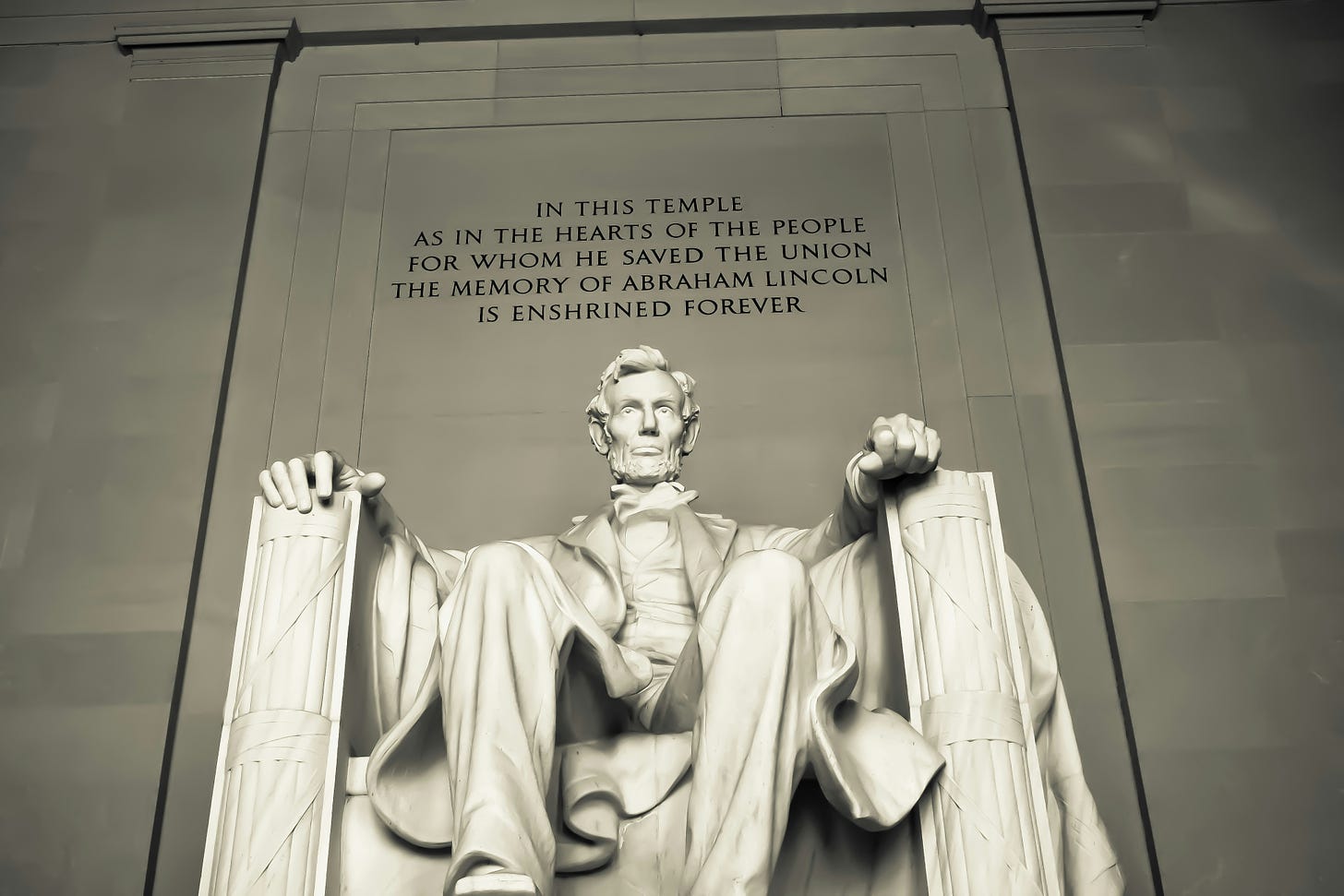In the wake of a decisive election, our call is to embrace humility, extend grace, and keep Christ at the center.
Wrapping up the week of the 2024 election in the United States, our nation finds itself divided: many are celebrating victory while many others grapple with defeat. What should Christians on both sides of the aisle do? How do we hold true to our core beliefs and love our neighbor? In the wake of a tumultuous election season, my latest blog post dives into the emotional and spiritual aftermath of the election. I will be exploring how we can hold steadfast to our core beliefs while fostering a spirit of compassion and understanding. Let’s not lose friends and family over a political event – however important it may be.
Distilling wisdom from Abraham Lincoln and C.S. Lewis, this blog is more than just reflection; it’s a call to action for every American who follows Christ. Why? Because your prayers matter. Your actions matter. Your words matter. Don’t miss this vital conversation—together, with God’s guidance, we can create the change we all desire to see.
Humility in victory and graciousness in defeat
In a world driven by competition and the desire for recognition, the values of humility in victory and graciousness in defeat stand as profound expressions of the truest of Christian virtues.
In a democratic system, every eligible citizen wields the power of one vote, making it the great equalizer. Yet, when election results clash with our values, it can be disheartening. Now, we find ourselves in a moment of reflection and catharsis—a concept in Greek tragedy, where at the end of the play, the audience has a moment to release their sadness and grief to make room for hope.
In moments like these, we can draw strength from the wisdom of those who have gone before us, such as former President Abraham Lincoln, and the beloved writer C.S. Lewis. Both men experienced remarkable successes as well as deep struggles, providing us with rich examples of how to navigate life’s challenges with faith, humility, and resilience. Their journeys remind us that God’s grace sustains us through both victory and defeat.
Abraham Lincoln- a profound example
A profound example of humility in winning and graciousness in losing is Abraham Lincoln, the 16th President of the United States. Throughout his political career, Lincoln faced numerous challenges and setbacks. Despite winning the presidency in 1860, he encountered fierce opposition and a deeply divided nation. Rather than gloating over his electoral victory, Lincoln approached his role with a sense of responsibility and humility, recognizing the weight of the office amid the Civil War.

Humility in Victory
Humility in victory reminds us that our achievements are not merely products of our own efforts but are ultimately gifts from God. As St. Paul reminds us in 1 Corinthians 4:7: “For who makes you different from anyone else? What do you have that you did not receive?” This perspective encourages believers to view victories as opportunities to glorify God rather than to elevate themselves. By maintaining humility, we recognize our shared humanity of all people, fostering a spirit of unity rather than division.
Gracious in Defeat
One of Lincoln’s most notable traits was his graciousness in defeat. After the 1858 Senate race against Stephen A. Douglas, which he lost, Lincoln famously stated, “A house divided against itself cannot stand,” signaling his commitment to national unity despite personal disappointment. He maintained respect for his opponents and sought to bring the country together, embodying the spirit of reconciliation.
Celebrate and Comfort
Lincoln’s leadership during the Civil War exemplified his ability to celebrate victories without arrogance and to comfort those who suffered losses. His Second Inaugural Address is a testament to this approach, as he called for healing and unity rather than retribution. Lincoln’s life illustrates that true greatness lies not in winning or losing but in how we conduct ourselves through both, embracing humility and graciousness as guiding principles.
Graciousness in losing reflects the Christian call to bear our failures with dignity and composure. Proverbs 16:18 reminds us, “Pride goes before destruction, a haughty spirit before a fall.” Accepting loss graciously enables us to learn and grow, embodying the Christian ethos of perseverance and resilience. This attitude exemplifies faith in God’s plan and serves as a testament to the strength of character shaped by grace.
The Celebrated C.S. Lewis
C.S. Lewis, celebrated for his intellectual prowess and literary achievements, faced profound personal loss with the death of his wife, Joy Davidman. In his poignant reflections in “A Grief Observed,” Lewis candidly explored his sorrow and how his faith helped him navigate his pain. His journey illustrates that even in grief, there is an opportunity to encourage others to find hope in God, reinforcing the idea that graciousness in loss can lead to spiritual growth and deeper understanding.

Both Lincoln and Lewis exemplify how humility in winning and graciousness in losing reflect the transformative power of Christ’s love.
Our Ultimate Hope
While leaders come and go, each carrying unique qualities and faults, placing our ultimate hope in any worldly figure, including politicians, can lead to disappointment. Even the best-intentioned leaders operate within human limitations, often prioritizing worldly values over heavenly ones. Scripture reminds us that our true citizenship is not of this world. In Philippians 3:20, Paul writes, “But our citizenship is in heaven. And we eagerly await a Savior from there, the Lord Jesus Christ.”
It is essential to never(!) elevate a national political leader to the level of adoration reserved for our Savior, Jesus Christ. While leaders may play vital roles in shaping our society, they are ultimately human and fallible, subject to flaws and failures. Placing our ultimate hope and devotion in any political figure can lead to disillusionment and disappointment. Instead, anchor our faith and trust in God alone, who offers true guidance, wisdom, and salvation. By keeping our priorities aligned with the teachings of Christ, we ensure that our hearts remain steadfast and focused on the eternal, rather than the next election cycle.
Grounding our hope for a better day in Jesus and his Kingdom rather than in any political leader or party connects us directly with the source of guidance, love, and stability that never falters. Jesus is the perfect leader. Jesus is Lord and King. Jesus is the only one who rules with perfect grace, compassion, and justice. He alone shows us a way of life that transcends earthly power struggles. When we anchor our trust in Him, we not only experience a peace that surpasses understanding but also find the strength to act as peacemakers in times of political and social unrest. As we navigate the challenges of our world, let us hold fast to this eternal hope, knowing that Christ is the true ruler of our hearts and the ultimate source of unity, peace, and lasting change. Selah.
The one thing we can agree on 🎵
The one thing we can all agree on is the need for God’s blessings on America. The famous patriotic song “God Bless America” written by Irving Berlin in 1918 and revised in 1938 express a deep love for the United States and a heartfelt prayer for its continued prosperity and peace.
I absolutely adore this powerhouse of a song! Why? Because its themes center around gratitude for the freedoms and blessings enjoyed in America. It also is a plea for God’s divine protection and guidance, and reflects a sense of unity and hope that we need during challenging times.
Over the decades, “God Bless America” has become a powerful anthem of resilience, and no one delivers it with more heart than Kate Smith in her iconic 1943 recording. Experience her unforgettable rendition here:
In times of national change, like Lincoln and Lewis, let us lead with humility in victory, and grace in defeat, paving a path to open dialogue. We all know it is very hard to be converted while experiencing condescension.
Above all, we must wholeheartedly embrace the command of 2 Chronicles 7:14: “If my people, which are called by my name, shall humble themselves, and pray, and seek my face, and turn from their wicked ways; then will I hear from heaven, and will forgive their sin, and will heal their land.” (KJV).
Let us stand firm in humility, relentlessly seek God’s presence, and pray for our leaders, no matter who lives the White House. Together, let’s be bold in our faith and unwavering in our commitment to God’s purpose!
May God bless you, and may God bless America.
— Angela MacKenzie








